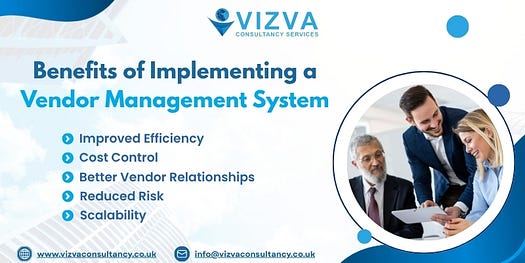Vendor Management System Solutions for Businesses

Businesses rely on a vast network of suppliers, vendors, and service providers in today’s more globalized and interconnected marketplace. Effectively managing these connections is essential to maintaining cost-effectiveness, lowering risks, and guaranteeing operational success. Vendor Management System (VMS) solutions are useful in this situation. Businesses’ interactions and management of third-party vendors are streamlined and optimized by these systems.
What Is a Vendor Management System?
An on-premises or cloud-based software program called a Vendor Management System (VMS) assists companies in managing their procurement procedures and vendor relationships. It offers a centralized platform for communication, contract administration, invoicing, compliance, and vendor performance tracking.
VMS solutions were first created for sectors like manufacturing, logistics, and IT services that had large supplier networks. Today, they are being used in a variety of industries, such as healthcare, retail, finance, and more.
Key Features of a VMS
Numerous features included in vendor management systems are intended to increase productivity and transparency. Among the most popular features are:
1. Vendor Onboarding and Qualification
Businesses can onboard new vendors more effectively and make sure they satisfy internal and regulatory requirements by using automated workflows. Before approving a vendor, the system gathers the required paperwork, certifications, and risk analyses.
2. Contract and Document Management
All vendor contracts and legal documents are managed and stored centrally by VMS solutions. This lowers the possibility of non-compliance and facilitates monitoring of service level agreements (SLAs), contract terms, and renewal dates.
3. Performance Monitoring
Businesses can monitor important vendor metrics like delivery schedules, product/service quality, cost-effectiveness, and customer satisfaction with real-time analytics and performance dashboards.
4. Risk and Compliance Management
Automated alerts and compliance checklists can be used to monitor and enforce vendors’ adherence to industry, legal, and regulatory standards.
5. Invoicing and Payment Tracking
Billing procedures are streamlined and errors are decreased with automated invoicing features. Strong vendor relationships are fostered by integration with financial systems, which guarantees on-time vendor payments.
6. Communication and Collaboration Tools
Internal teams and external vendors can communicate more easily thanks to integrated messaging and collaboration tools, which enhances problem solving and decision-making.
Benefits of Implementing a Vendor Management System

Businesses can benefit strategically and operationally from implementing a VMS in a number of ways, including:
1. Improved Efficiency
Automation shortens procurement cycles, eliminates manual processes, and frees up employees to engage in more strategic tasks.
2. Cost Control
A VMS can find ways to cut costs and avoid budget overruns by monitoring expenditures and improving vendor contracts.
3. Better Vendor Relationships
Building trust with vendors through timely and transparent communication leads to more dependable and advantageous collaborations.
4. Reduced Risk
By keeping an eye on vendor performance and compliance, business operations disruptions are reduced and risks are identified early.
5. Scalability
A VMS can readily expand to handle additional vendors, contracts, and data as a company expands without sacrificing functionality.
Choosing the Right VMS Solution
Businesses should take into account a number of factors when choosing a vendor management system:
- Customization: Is it possible to customize the system to meet particular assiduity conditions or internal procedures?
- Integration: Does it work with current fiscal, CRM, or ERP systems?
- User Experience: Are external merchandisers and internal druggies suitable to fluently navigate the interface?
- Security: Does the system have strong stoner access controls and data protection?
- Support and Training: Are there sufficient coffers for client service, training, and onboarding?
Depending on the size and needs of the business, leading VMS providers such as SAP Fieldglass, Coupa, Oracle, GEP SMART, and Zoho Creator offer varying degrees of sophistication.
Future Trends in Vendor Management
Vendor management is evolving rapidly with the integration of new technologies:
- AI and Machine Learning: These are employed to forecast problems, examine trends in vendor performance, and suggest enhancements.
- Blockchain: for better transparency in contract management and supply chain integrity monitoring.
- Sustainability and ESG Tracking: VMS tools are adding functionality to monitor supplier sustainability practices as businesses are under pressure to meet environmental, social, and governance (ESG) goals.
Conclusion
A Vendor Management System is no longer a luxury but a necessity for businesses that calculate on multiple third- party suppliers. With its capability to polarize seller data, streamline processes, insure compliance, and optimize connections, a VMS empowers businesses to operate more efficiently and competitively. As force chains come more complex and globalized, investing in a robust VMS is a smart move toward long- term success.
Source : https://vizvaconsultancy.co.uk/vendor-management-system/



Comments
Post a Comment